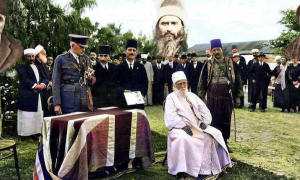The Baha’is say among themselves that: “Khomeini hated the Baha’is!” of course, it is true to say: “Imam Khomeini (P.H.) hated Baha’ism.’ Yes, imam stated: “If we didn’t have any reason for them to be the spies of America, their support by Reygan would be enough for us. Baha’ism isn’t a religion. It is a party. A party which was supported by the English in the past and now America is supporting them.[1]”
The historical root of imam’s statement:
During Qajar dynasty, a person called Ali Muhammad Shirazi claimed first for the being the gate (the mediator between people and Imam of the Time) He had been famous for Seyyed Bab. After a while, he called himself as Imam of the Time. Later, he wrote a book called Bayan and claimed for the abolishment of Islam. Several people were deceived and the country was afflicted by chaos. Amir the great ordered for Seyyed Bab to be arrested, denounced and executed. After Seyyed Bab, Mirza Yahya Nouri entitled Sobhi Azal became his successor. Nevertheless, Mirza Yahya’s brother, Hussein Ali Nouri (known as Bahaullah) called Mirza Yahya as great liar and cunning: He introduced himself as Seyyed Bab’s real successor. During a short period of time, he claimed for prophethood and gathered some people. Eventually, Bahaullah was imprisoned; but he got free from prison pursuing by the Russian embassy. After getting free from prison, Bahaullah wrote a letter to Alexandre II (Russian czar) and thanked him for his unsparing supports; to such an extent that he called himself as Russian czar slave. There are many times; according to the Baha’i documents, when Bahaullah and his relatives sought asylum to the czar Russian embassy[2]. Later on, Bahaullah was exiled to Acre (Palestine) and surrounded by the Ottoman government. At the same time, he was in touch with both Russia and England. He died in 1892. After him, his son Abbas effendi (Abdul Baha) became the leader of Baha’ism movement. When the czar government fell down in 1917, the Baha’ism heads got disappointed with the Russian communist government and turned to the British government totally[3]. It happened when England had occupied Palestine[4]. In 1918, when the British army conquered Heifa, Abdul Baha took over providing the provisions for the British army. To thank his services, the British government bestowed him the Nighthood Medal[5].
Praising the old British Colonialism justice[6], Abdul Baha took a trip to London, he claimed for the universal peace by England.[7] Abdul Baha and other Baha’i heads played an essential role in occupying Palestine by England. As the Ottoman government concluded that occupying Palestine by England occurred by the treachery of Baha’is and Ahmad Jamal pasha (the commander of the sea force of the ottoman government and the ruler of Syria and Lebanon) planned to revenge this treachery and to crucify Abdul Baha[8].
During Pahlavi period of time, the Baha’i movement was spying for England and Israel against Iran and Islam. As Hussein Fardoust writes in his memoirs: “The Baha’is I have seen didn’t really feel they were Iranians and it was quite sensible and such people were spies intrinsically.[9]” during the current periods of time, the Baha’ism movement is treacherous against Iran as the infantry of the Colonialism system. The active presence in 1388 sedition, providing and making films and photos of the country problems and sending them for the foreign media are of the samples of the issue. Also; according to security people in charge, most girls who unveiled were Baha’is. Even, during the last year, the Baha’ism movement formed come mafia bands to heard masks during Corona virus conditions.[10]
Thus, it can frankly be said that Baha’ism isn’t a religion; but it is a political party related to Colonialism.
[۱] Sahifeh Nour written by Imam Khomeini (P.H.), Vol. 17, p. 460.
[۲] Amanullah Shefa, A letter from Saint Palo, p. 316.
[۳] Jawad Nawaeeyan Roudsari, the Spider web, Mashhad: Khorasan artistic and cultural institute, 1394, p. 36.
[۴] Shoqi Effendi, Badi’a century, translated by Nasrullah Mawaddat, p. 291.
[۵] Lady Bloomfield George Ronald pub, 2007, pp. 201-210. The chosen Highway.
[۶] Abbas Effendi, Makatib, Egypt: Farajullah Zakiul Kurdi, 1921 A.D., Vol. 3, p. 347.
[۷] Abbas Effendi, the Sermons, Vol. 3, p. 90.
[۸] Shoqi effendi, Badi’a century, Vol. 1, p. 299.
[۹] Hussein Fardoust, the emergence and falling of Pahlavi kingdom, Biga: Ettela’at, 1370, Vol. 1, p. 282.
[۱۰] Dana Correspondance, the news title: the Baha’i band of Hoarding masks in several cities of the country






